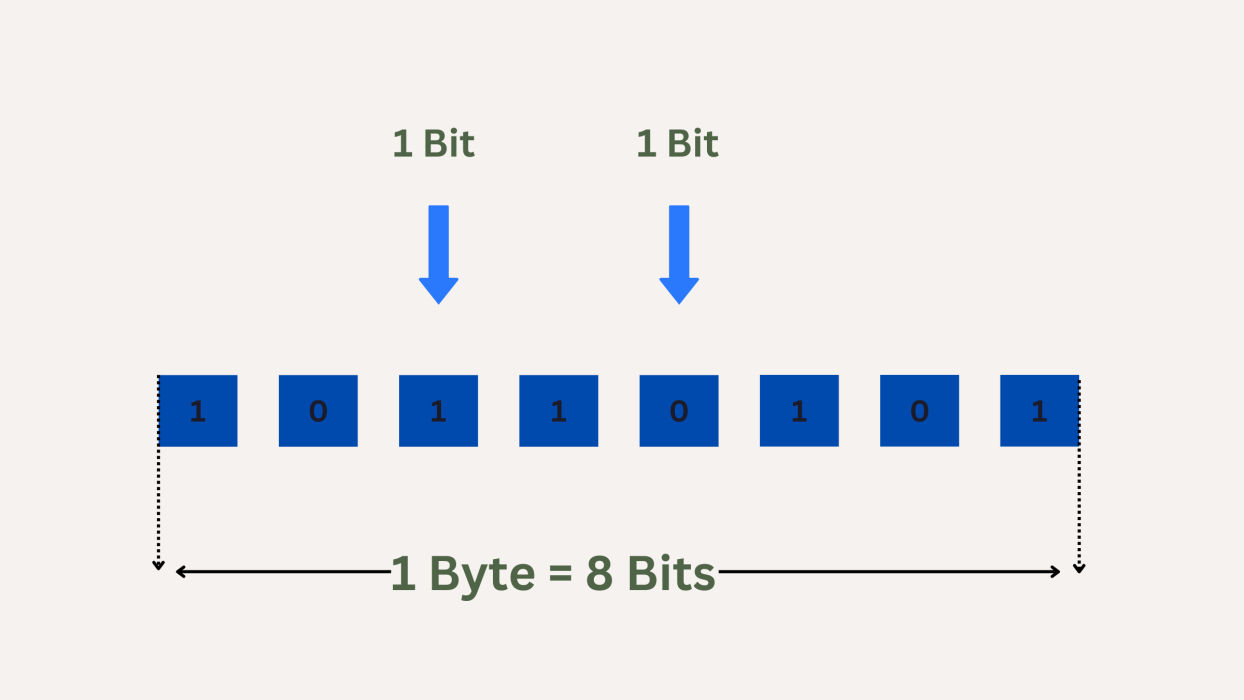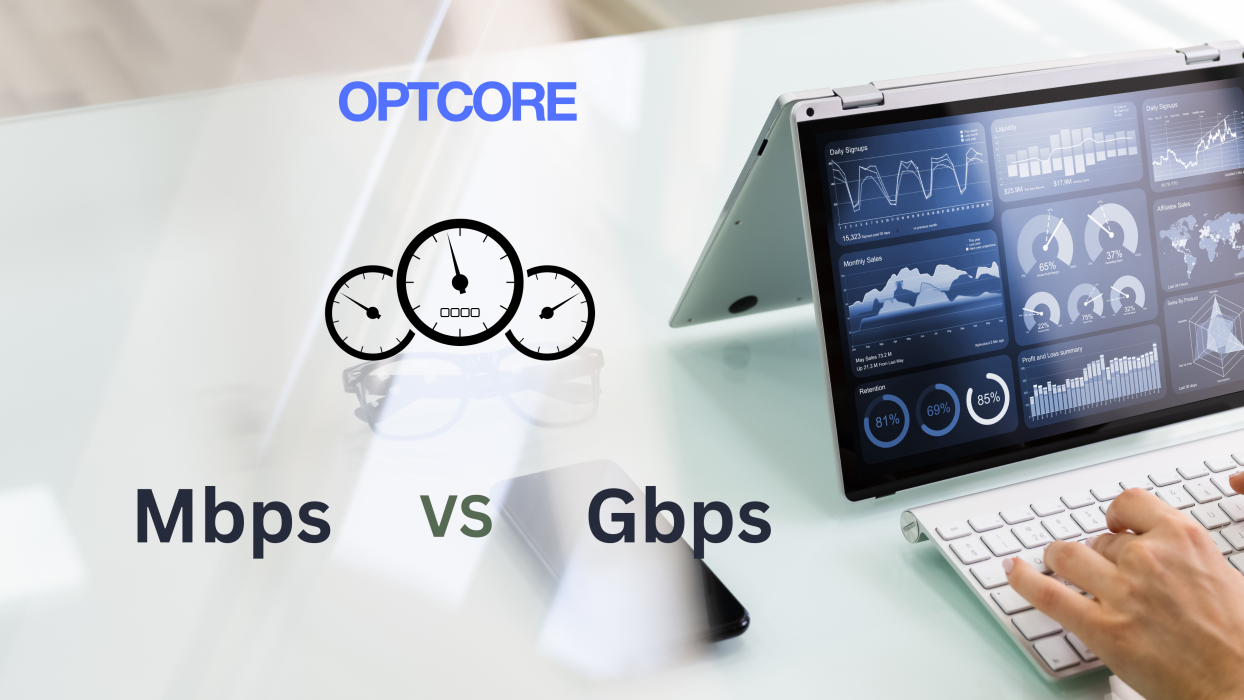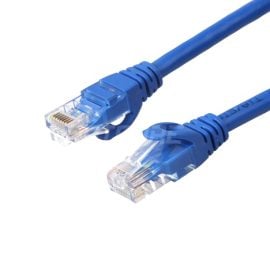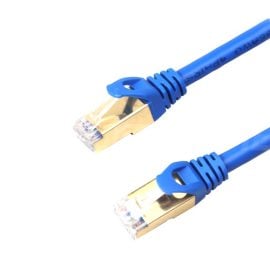Blog, Network Cabling
Mbps vs Gbps, What Are the Differences and Which Is Better?
Whether playing online games or surfing the internet, you may have vastly different experiences, like sitting on a roller coaster. The problem lies in your internet speed, commonly measured in Mbps (megabits per second) and Gbps (gigabits per second). Knowing the differences between Mbps vs Gbps is a crucial factor affecting how you can choose correctly for your specific needs.
This blog aims to compare how different Mbps and Gbps are and introduce their specific use cases so that you can decide the most suitable speed for your internet.
Table of contents
Mbps vs Gbps: Definitions
As the two abbreviations measuring different internet speed rates, Mbps and Gbps stand for megabits per second and gigabits per second, respectively. The number of bits users can send and receive each second varies from Mbps to Gbps. What tells them apart is their capacity for data transmission.

Mbps
Referred to as “megabits per second”, Mbps is a parameter that measures data transfer rates. This parameter is a standard way of measuring your internet speed. If put in a mathematical way of thinking, 1 Mbps is equivalent to 1 million bits per second.
Here, you need to pay attention to another term that may confuse you: MBps. It represents “megabytes per second”, a metric measuring file sizes or data storage capacity. However, Mbps mentioned in this blog measure data transfer speed.
Gbps
Unlike Mbps, Gbps gets its name from “gigabits per second”. Much faster than Mbps, Gbps shows that your network devices transfer one billion bits of data every second. Gbps is also a suitable network speed required by large enterprises, data centers, and fiber optic internet infrastructure.
Various network cables can support different data rates, and our website offers these, ranging from Cat5e, Cat6, and Cat6A to Cat8. For example, Cat6 Ethernet cables support 1 Gbps over distances of up to 100 meters. In comparison, Cat8 Ethernet cables can reach a speed of up to 40 Gbps within 100 meters.
OPTCORE Ethernet Cables
-
Cat6 Ethernet Network Patch Cable, Snagless Unshielded (UTP), PVC, Blue
Price range: US$ 0.85 through US$ 13.10 (Excl. VAT) -
Cat6 Snagless Shielded (SFTP) Ethernet Network Patch Cable, PVC, Blue
Price range: US$ 1.29 through US$ 17.70 (Excl. VAT) -
Cat7 Snagless Shielded (SFTP) Ethernet Network Patch Cable, PVC, Blue
Price range: US$ 2.20 through US$ 25.80 (Excl. VAT) -
Cat8 Snagless Shielded (SFTP) 25G/40GBase-T Ethernet Network Patch Cable, PVC, Black
Price range: US$ 2.25 through US$ 28.80 (Excl. VAT)
Note: Bits and bytes are two different metrics. Typically, B (capitalized) means bytes, and “b” (lowercase) stands for bits.
One byte consists of 8 bits, and the minimum unit is measured in binary as either digits 0 or 1. When describing the internet, we often rely on bits to measure internet speeds and bytes to measure file sizes and data storage.

Conversion of Gbps to Mbps
Although Mbps and Gbps differ in their definitions, speeds, and use cases, converting from one to another is very easy. The calculation formula is pretty simple. If you want to move Gbps to Mbps or vice versa, you can divide or multiply by 1,000.
For example, to identify how fast a 20 Gbps internet connection is in Mbps, you need to multiply by 1,000:
The formula is: 20 × 1,000 = 20,000 Mbps
If you convert the network speed of 4000 Mbps into Gbps, you divide by 1,000:
The formula is: 4000 ÷ 1,000 = 4 Gbps
Mbps vs Gbps: Speeds
Another key difference between Mbps and Gbps is that the latter provides faster and more reliable speeds for your internet connections. If you compare the speeds of a snail and an automobile, you can know that Gbps runs faster than Mbps.
The speed range of Mbps is from 1 Mbps to 999 Mbps, while that of Gbps reaches 1 Gbps or above. A megabit speed is enough for regular families, and speeds from 300 to 500 Mbps are generally their ideal plans.
The speeds between 10-50 Mbps apply to basic activities online, such as surfing the web, watching movies in standard definition, and sending emails. A 100 Mbps speed can be better for larger households with multiple devices that family members use. Such a speed can meet their working, gaming, or streaming requirements.
A gigabit speed (1 Gbps) or higher suits the needs of the heaviest internet users and families with many hardcore gamers.
Mbps vs Gbps: Use Cases
Mbps is adequate for residential connections, providing internet speed up to 1000 Mbps (1 Gbps). However, Gbps meets the demands of making business and enterprise-level connections.
Use Cases for Mbps
Residential Use: Mbps can provide the basic internet needs for regular households with light internet use. The speed range from 25 to 100 Mbps can support households of 2-4 users well.
Web Browsing and Social Media: With a network of about 1-10 Mbps, users can do activities like sending or receiving their emails, browsing news on the webpages, and operating their social media accounts.
Video Streaming and File Downloading: When users need to download large files or browse HD streaming content, higher Mbps can offer better reliability and more robust performance. Major video streaming platforms, including YouTube, usually need 5 to 25 Mbps to ensure HD quality.
Use Cases for Gbps
Households with Multiple Devices: If households connect multiple devices at the same time for high-bandwidth activities, they should select a Gbps internet plan.
Remote Workers: They often engage in video conference meetings, so a Gbps speed helps distribute documents and files more quickly. This internet speed ensures more effective operation of cloud services and enhances their work efficiency.
Data Centers and Corporate Use: Mbps cannot reach their standards, as enterprise networks need to connect multiple devices simultaneously. Enterprises also heavily rely on the use of cloud services, so Gbps is a better choice for them to keep workflows smooth. Besides, with well-deployed Gbps facilities, data centers replicate crucial data more rapidly.
Mbps vs Gbps: Which is Better
We can determine which speed is faster at once based on the definitions of Mbps and Gbps. However, choosing a suitable internet speed for your devices requires considering many factors, including internet needs, budget planning, future-proofing, etc.
Home Use: Small families with lower demands for network speeds can consider Mbps instead of Gbps. They usually need to surf the internet, stream music, check emails, and play light online games. Large households often watch 4K videos, so they had better consider a Gbps internet. If your focus is on the smooth downloading of online games and streaming videos, Gbps connections are an optimal choice.
Business Use: Remote workers frequently attend video meetings, so they prefer higher Mbps or Gbps speeds. For data-intensive industries, they always focus more on large data uploads or downloads. In this case, they can benefit a lot from Gbps network speeds.
Future-Proofing: A Gbps speed is a big advantage because technology will advance quickly. When more high-bandwidth applications arise, a Gbps connection can be very beneficial.
FAQs
1. What is the difference between Gbps and GBps?
Gbps stands for gigabits per second, whereas GBps is the short form for gigabytes per second. The lowercase “b” is used in Gbps, which is for bits, while uppercase “B” is for MBps, which means Bytes. Since 1 byte = 8 bits, then 1 GBps equals 8 Gbps.
2. Is 1,000 Mbps really fast?
If your internet speed reaches 1,000 Mbps or 1 Gbps, you will experience quite fast gigabit internet. There’s no need to use a gigabit internet to stream HD movies or play online games without latency. However, gigabit speeds are necessary for some households to handle multiple online users.
3. Do I need a gigabit internet for regular household use?
Referring to the FCC (Federal Communications Commission), you just need internet speeds up to 25 Mbps to do many activities like sending emails and surfing the internet. An Mbps internet connection is adequate for most household use.
Conclusion
After reading this article, you can have a definite answer to the question of “Gbps vs Mbps, What Are the Differences and Which Is Better?”. Although Gbps has much higher data transfer rates, it may not be necessary for most families. Instead, Mbps can satisfy the basic needs of regular families.
Compared to Mbps, Gbps is more suitable for data centers and enterprise networks that have multiple devices and various operational requirements. Before deciding which speed you really need, you should carefully compare the disparities of Mbps and Gbps and truly know your internet usage.
Reference
- https://www.amazon.in/difference-between-Mbps-Gbps










